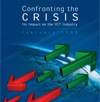|
Technological advances constantly reshape the Telecommunications and Information and Communication Technologies (ICT) sector. Considering this, the ITUís Corporate Strategy Division tracks changes in rapidly evolving technologies, market trends, and regulatory framework in order to promote information exchange among the membership with the objective of adjusting ITUís work programme to meet the Unionís Strategic Orientations and Goals.

|
 |
|
|
EMERGING TRENDS QUARTERLY coming
soon...
Emerging Trends Quarterly is a periodic newsletter that focuses on new trends in the ICT and telecommunication sector. Prepared by the Corporate Strategy Division, each issue of ETQ analyzes the strategic
impact that new technology developments, market strategies and regulatory frameworks will have in the sector. The Newsletter is aimed primarily at ITU Membership and is open to comments and suggestions by
the Membership
FINANCIAL CRISIS
 The global economy is currently navigating uncharted waters. Many forecasting firms are struggling to predict the impact and future direction of the economy, on the basis that previous models no longer apply. ITU remains deeply concerned by the impact of the financial crisis on its Member States and Sector Members. In November 2008, ITU has commissioned a Report bringing together informed analysis from leading industry experts on the future outlook for the industry and exploring how the financial crisis may impact the telecommunication and ICT sectors. ITU hosted a Strategic Dialogue on the impact of the financial crisis at the World Telecommunication Policy Forum, held in Lisbon, Portugal, on 21 April 2009. The global economy is currently navigating uncharted waters. Many forecasting firms are struggling to predict the impact and future direction of the economy, on the basis that previous models no longer apply. ITU remains deeply concerned by the impact of the financial crisis on its Member States and Sector Members. In November 2008, ITU has commissioned a Report bringing together informed analysis from leading industry experts on the future outlook for the industry and exploring how the financial crisis may impact the telecommunication and ICT sectors. ITU hosted a Strategic Dialogue on the impact of the financial crisis at the World Telecommunication Policy Forum, held in Lisbon, Portugal, on 21 April 2009.
HANDLE SYSTEM
 The Handle System is a general-purpose distributed information system that provides efficient, extensible, and secure identifier and resolution services for use on networks such as the Internet. It includes an open protocol, a namespace, and a reference implementation of the protocol. It provides the underlying infrastructure and services rather than end-user applications. The Handle System protocols enable a distributed computer system to resolve and store the identification information (or handles) of digital resources into the elements needed to locate, access, and otherwise manage names for Internet resources. The Handle System is a general-purpose distributed information system that provides efficient, extensible, and secure identifier and resolution services for use on networks such as the Internet. It includes an open protocol, a namespace, and a reference implementation of the protocol. It provides the underlying infrastructure and services rather than end-user applications. The Handle System protocols enable a distributed computer system to resolve and store the identification information (or handles) of digital resources into the elements needed to locate, access, and otherwise manage names for Internet resources.
|



